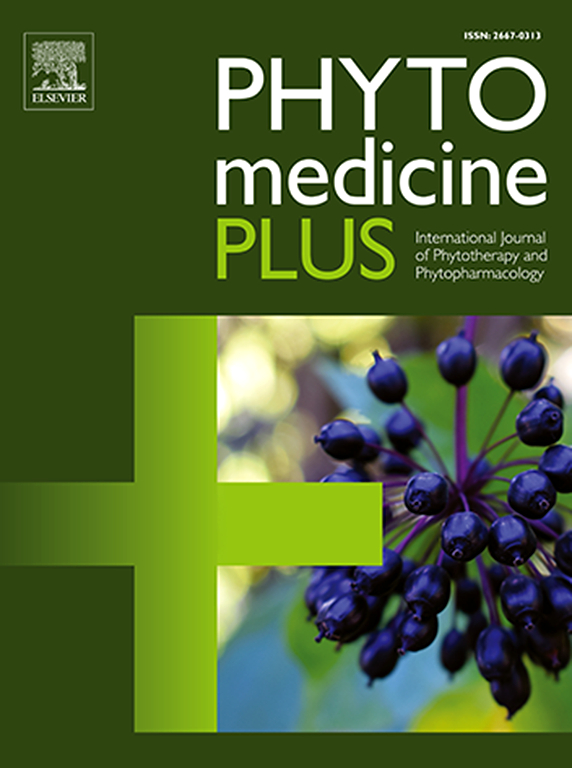The role of gut microbiota in disease management: Ayurvedic perspectives on metabolic diseases and health
Q3 Pharmacology, Toxicology and Pharmaceutics
引用次数: 0
Abstract
Background
In the past few years, the critical role of gut microbiome in the maintenance of overall health and various diseases has captured significant attention. Various studies underline the importance of maintaining a healthy gut. For centuries, Ayurvedic medicinal plants have been used to treat gut-related diseases and are believed to act as prebiotics, thereby enhancing beneficial gut bacteria. These plants possess incredible therapeutic properties and are able to inhibit TNF-α, NF-κB, COX, LOX, α-amylase, α-glucosidase, etc. They are well documented and used for treating conditions like IBS, chronic diarrhoea, constipation, ulcerative colitis, Agnimandya (digestive impairment), Mandagni (impaired digestive fire) and other gut-related diseases.
Purpose
This review is aimed at collecting scientific insights on gut health, focusing on traditional medicinal plants like Babool, Turmeric, Ashwagandha, Ghrit kumari, Tulsi, Harad, Baheda, Amala, and the Triphala formulation. Exploring their phytoconstituents and Ayurvedic formulations, we uncover their role in nurturing gut microbiota and combating various gut disorders.
Study design and methods
Consultation of various Databases and search engines such as PubMed, ScienceDirect, ResearchGate, Google Scholar, SciFinder, and other published/unpublished resources provided an overview of the published literature on the topic.
Results
The human body is composed of both human cells and microbial cells. These microbes, when present in the gut, are collectively known as gut microbes. These have direct or indirect effects on an individual's health and diseases, viz. dysbiosis, UC, IBD, cardio-vascular diseases, chronic kidney disorders, etc. The interaction of various phytoconstituents present in the MFH plants with the gut microbiota has a two-way effect. While the phytoconstituents can modulate the growth of useful gut bacteria, such as Bifidobacterium and Lactobacillus, these microbes have enzymes that help in the transformation of plant moieties into active metabolites which have beneficial effects.
Conclusion
It can be concluded that Ayurvedic MFH plants and formulations can help our gut stay healthy. The available literature describes that these natural remedies are quite effective in treating different gut problems. In conclusion, Ayurvedic remedies could be a great way to keep our digestion in check and improve overall health.

肠道微生物群在疾病管理中的作用:阿育吠陀对代谢性疾病和健康的看法
在过去的几年里,肠道微生物群在维持整体健康和各种疾病中的关键作用引起了人们的极大关注。各种研究都强调了保持肠道健康的重要性。几个世纪以来,阿育吠陀药用植物一直被用来治疗肠道相关疾病,并被认为是益生元,从而增强有益的肠道细菌。这些植物具有令人难以置信的治疗特性,能够抑制TNF-α、NF-κB、COX、LOX、α-淀粉酶、α-葡萄糖苷酶等。它们被充分记录并用于治疗肠易激综合征、慢性腹泻、便秘、溃疡性结肠炎、Agnimandya(消化功能障碍)、Mandagni(消化功能障碍)和其他肠道相关疾病。目的收集有关肠道健康的科学见解,重点介绍巴布尔、姜黄、Ashwagandha、Ghrit kumari、Tulsi、Harad、Baheda、Amala和Triphala制剂等传统药用植物。探索它们的植物成分和阿育吠陀配方,我们发现它们在培养肠道微生物群和对抗各种肠道疾病中的作用。研究设计和方法查阅各种数据库和搜索引擎,如PubMed、ScienceDirect、ResearchGate、b谷歌Scholar、SciFinder和其他已发表/未发表的资源,提供了关于该主题的已发表文献的概述。结果人体由人体细胞和微生物细胞组成。这些存在于肠道中的微生物统称为肠道微生物。这些对个人的健康和疾病有直接或间接的影响,如生态失调、UC、IBD、心血管疾病、慢性肾脏疾病等。MFH植物中存在的各种植物成分与肠道微生物群的相互作用具有双向效应。虽然植物成分可以调节有益肠道细菌的生长,如双歧杆菌和乳酸杆菌,但这些微生物具有帮助将植物部分转化为有益代谢产物的酶。结论阿育吠陀MFH植物及其制剂有助于肠道健康。现有的文献描述了这些自然疗法对治疗不同的肠道问题相当有效。总之,阿育吠陀疗法可以很好地控制我们的消化,改善整体健康。
本文章由计算机程序翻译,如有差异,请以英文原文为准。
求助全文
约1分钟内获得全文
求助全文
来源期刊

Phytomedicine Plus
Medicine-Complementary and Alternative Medicine
CiteScore
3.70
自引率
0.00%
发文量
178
审稿时长
81 days
期刊介绍:
 求助内容:
求助内容: 应助结果提醒方式:
应助结果提醒方式:


